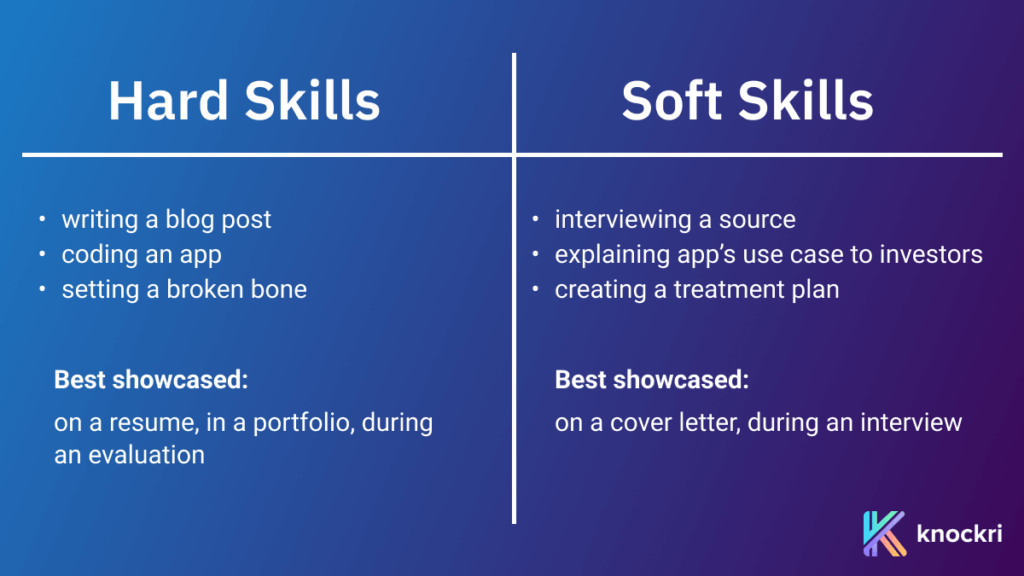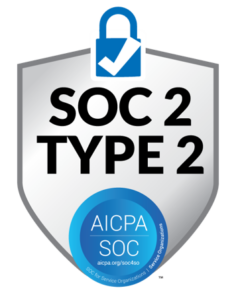In hiring, your first touchpoint with a candidate is likely a resume, application, or portfolio. You might learn about the candidate’s education, geographic location, and previous work experience. You can get an idea of their design or writing style and what computer programs they have experience with.
But to make a genuinely informed choice, especially if deciding between candidates with similar qualifications and skills, you need more information: their communication style, ability to adapt to change, and approach to problem-solving.
Resumes and portfolios won’t tell you these things because they don’t provide a complete picture of a candidate. If they did, job interviews would be unnecessary.
This is where we distinguish between hard skills and soft skills.
Hard skills, also known as “technical skills,” are tangible and often process-oriented. They can be explained straightforwardly and taught to others. Hard skills are often repetitive and involve the same or similar steps every time.

Soft skills, on the other hand, are intangible. They can be taught to a degree, mainly in the form of guidelines and strategies, but are challenging to codify because they are scenario-dependent. For example, convincing investors of the value of a software is not a copy-and-paste process because each investor may have different interests, goals, and means and therefore must be approached differently.
There are a variety of soft skills, but common ones include:
- problem-solving
- teamwork
- work ethic
- communication skills
- conflict resolution
- time management
- adaptability
- leadership
Why are soft skills important to your hiring process?
Soft skills take an applicant from “qualified” to “successful.” Thousands of candidates may have experience with a specific computer program. Not all of them may have soft skills like adaptability, communication, and the ability to see patterns in data to fulfill all the tasks required of a developer. These candidates stand out from the rest of your talent pool and can go above and beyond the requirements listed in a job description.
Moreover, hard and soft skills go hand in hand. Hard skills are knowledge-based, and soft skills allow the candidate to adapt this knowledge to different situations or in new and unique ways.
Whether hiring externally or internally, making the right hiring decision means gaining as much understanding as possible about a candidate and striving for high quality of hire in your recruitment process.
Here are four ways soft skills contribute to quality of hire.
Soft skills contribute to longevity in the company
Soft skills are essential to employee career growth. They are transferable between roles and remain valid even when technology advances or workplaces change in response to events like a pandemic or financial crises. Employees who demonstrate soft skills like adaptability and a growth mindset are more resilient to change. Additionally, employers who invest in employee training and development have lower turnover rates and experience higher employee productivity.
Soft skills improve your work environment
Communication, teamwork, conflict resolution, and problem-solving are essential to cultivating a harmonious work environment. A positive environment contributes to employee satisfaction and productivity, leading to improved retention.
Evaluating candidates on skills like communication, initiative, and teamwork can help you decide which candidate will best fit your team structure, workflow, and company culture. For example, teamwork is vital to work in a highly collaborative environment but may be less important in a role that involves primarily individual work.
Soft skills will help grow your internal talent pool
Someone with the required hard skills for a role will likely do well but may not be able to translate these skills to different scenarios or positions. Soft skills are vital if you value employee growth and plan to invest time and money in training personnel. These skills are transferable between roles, so employees will not only be able to perform the position they were hired for but will become prime candidates for internal hiring and mobility.
Soft skills are beneficial to the employee and the company
Obtaining or improving soft skills has far-reaching positive impacts on everything from employee productivity to retention and return on investment in training.
Case Study: How soft skills made waves in CPA entrance exams
A 2014 analysis of the Chartered Professional Accountant (CPA) profession revealed that today’s accountants have a greater need for skills like problem-solving and information analysis.
Traditionally, the CPA certification exams mainly tested “book-smarts” and emphasized memorizing content but left newly licensed CPAs out of their depth in real-world situations. In 2017, the exams were modified to include more situation-based questions and fewer multiple-choice questions to test communication, critical thinking, and other soft skills.
How to evaluate soft skills
Not every role comes with its own exam to pre-screen candidates for soft skills. How do you evaluate soft skills consistently when every company and position is different?
Outside of a crystal ball, there is no way to be 100% certain about a candidate’s future success. But there are ways to assess candidates’ soft skills and behaviors that predict future performance.
The pros and cons of structured behavioral interviews
The best way to do this in the hiring process is through structured behavioral interviews (SBIs). These interviews involve asking candidates scenario-based questions and judging their answers against a rubric. SBIs work well to evaluate candidates because they are:
- Consistent: Each candidate is asked the same questions — this is where being “structured” comes in — so interviews are consistent and answers from different candidates are comparable.
- Objective: Rubrics are based on behaviors, so the interviewer can score candidates on a rating scale.
- Accurate: SBIs are proven to be predictive of job performance.
- Equal across groups: Other selection procedures result in differences between groups. For example, Group A of individuals of a certain race has higher average results than Group B of individuals of another race. SBIs minimize this difference.
The issue is that SBIs are costly to implement. They take up interviewer time and resources during both interviewing and scoring. Once the process is complete, there is also the potential for human bias to impact results.
How Knockri scales up SBIs efficiently and objectively
Knockri evaluates candidates using SBIs but avoids bias and heavy resource use issues through artificial intelligence and machine learning.
Interviews are asynchronous and scored against a framework developed through Industrial-Organizational Psychology. This reduces the time and energy recruiters use in conducting interviews and scoring and human bias and error that might creep into human-determined scores.
Because each candidate for a role takes the same assessment, scores are comparable. They can also be broken down by skill to compare candidates’ proficiency in Leadership, Growth Mindset, Problem Solving, and other skills.
You can scale assessments to evaluate thousands of candidates at once. The focus on soft skills evaluation means Knockri can also be used for internal mobility, assessing skill gaps, and directing further training in addition to your talent acquisition process.
To learn how Knockri can help improve your quality of hire through evaluating soft skills, book a demo and chat with our HR Solutions Consultant.



